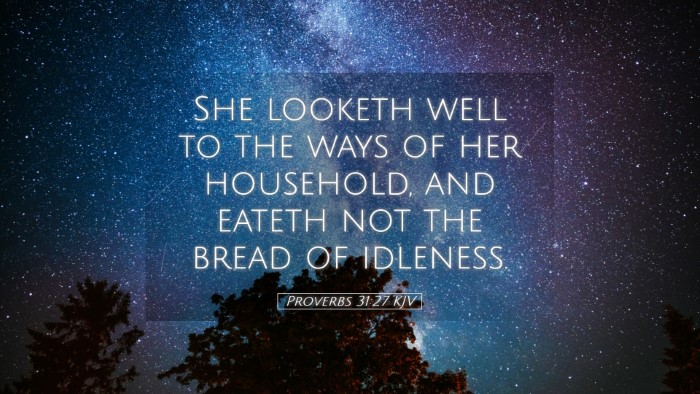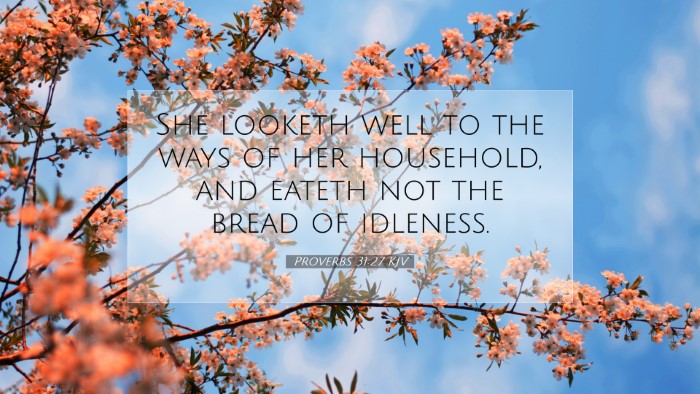Commentary on Proverbs 31:27
Verse: “She watches over the ways of her household, And does not eat the bread of idleness.”
This verse from Proverbs is part of the well-known passage describing the virtuous woman, often referred to as the "Woman of Valor." It encapsulates her diligence and the active role she plays within her household.
General Insights
According to the commentaries of Matthew Henry, Albert Barnes, and Adam Clarke, several key themes emerge from this verse:
- Watchfulness: The virtuous woman is observant and vigilant regarding her household. She is not merely passive but actively engages in ensuring her family’s needs are met and that the household operates smoothly.
- Responsible Stewardship: The emphasis on her watching over her household suggests a sense of stewardship. She is entrusted with the welfare of her family, and she fulfills this role with care and precision.
- Rejection of Idleness: The last phrase of the verse is particularly striking. It suggests that idleness is not a characteristic of her life. Instead, she is industrious, recognizing that her labor contributes to the thriving of her family.
Detailed Analysis
1. The Role of Observation and Care
Henry emphasizes that the woman's watchfulness is a reflection of her deep commitment to her family. She does not merely oversee their daily activities, but is intimately involved in their lives, ensuring that moral and spiritual guidance is present. This highlights the importance of being attentive to the needs and behavior of one's family members. Such vigilance is critical for nurturing a healthy family environment.
2. Diligence in Domestic Affairs
Barnes points out that the phrase "does not eat the bread of idleness" implies that her contributions are both physical and emotional. She does not lounge about, but instead, her work is a labor of love. This serves as an admonition to all; idleness can lead to neglect, and the virtuous woman is a model of active engagement.
3. Spiritual Implications
Clarke expands on the spiritual dimension of this verse. The active role of the woman in her household can be seen as a metaphor for the spiritual vigilance expected from believers. It reflects the call for Christians to participate actively in their faith and to minister to those entrusted to them, whether within their families or their broader communities.
Theological Applications
From a theological perspective, Proverbs 31:27 is rich with applications for both men and women in the context of family and community:
- Leadership at Home: This passage suggests that effective leadership in the home requires active involvement. Leaders must be present and engaged to foster growth and harmony.
- Work Ethic: A biblical work ethic involves recognizing the value of hard work and the perils of idleness. This is echoed throughout Scripture, where diligence is commended as a virtue.
- Community Impact: The woman’s role is not just limited to her household; it extends to the community. When a mother or wife is vigilant and industrious, it has far-reaching implications for society.
Practical Implications for Today’s Context
The lessons gleaned from this verse are applicable to modern contexts:
- Encouragement for Wives and Mothers: This verse serves to uplift and encourage women in their roles, affirming the significance of their work in nurturing families.
- Divine Setup of Family Structure: It underscores the importance of active participation in family life, highlighting that everyone has a role to play in fostering a nurturing environment.
- Call for Accountability: It urges individuals to reflect on their contributions to their households, assessing whether they are active participants or passive observers.
Conclusion
Proverbs 31:27 provides a powerful summation of the characteristics of a virtuous woman, illuminating the values of vigilance and industriousness that are essential for nurturing a thriving household. Engaging with this verse challenges readers—pastors, students, and theologians alike—to consider how they can embody these qualities in their personal lives and ministry, fostering a spirit of diligence and care in their families and communities.


